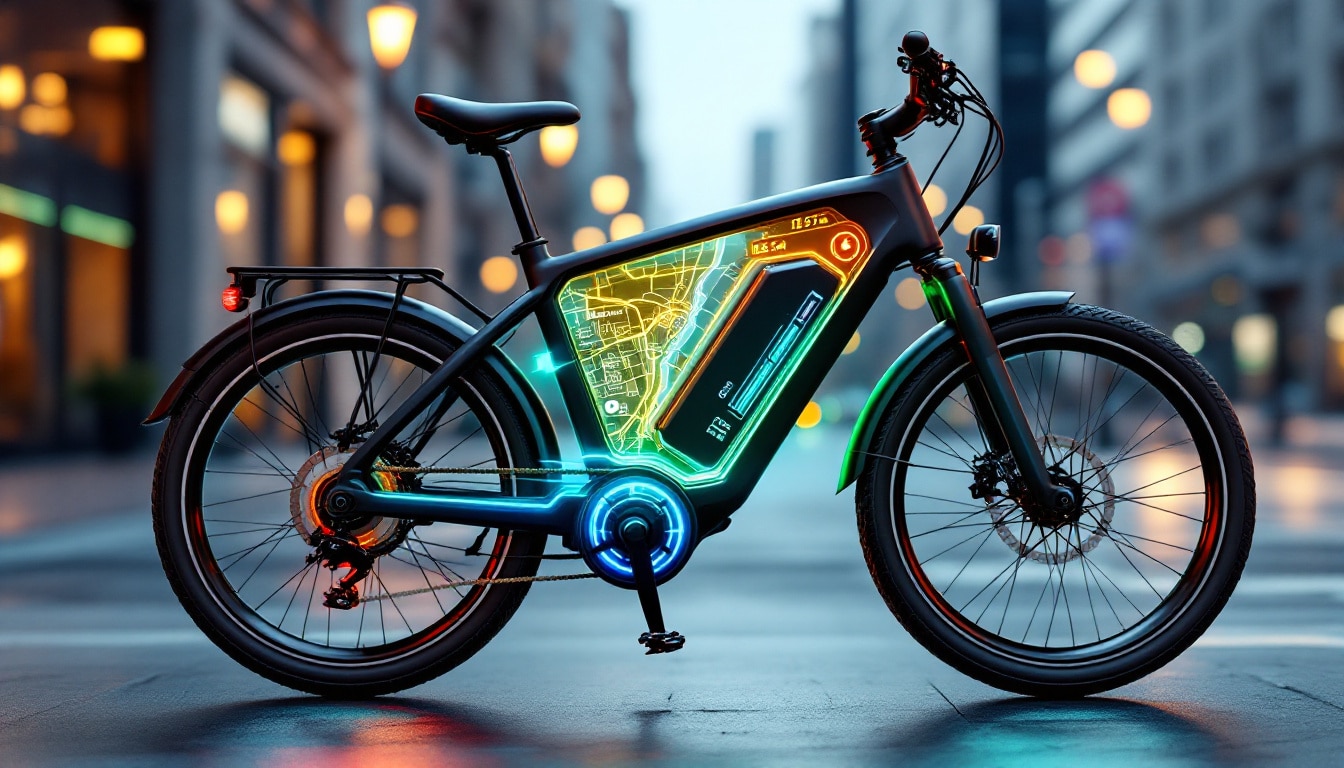Guide complet pour choisir le vélo électrique idéal en 2024
Les vélos électriques révolutionnent nos déplacements quotidiens en combinant efficacité, écologie et plaisir de rouler. Face à la multitude de modèles disponibles sur le marché, faire le bon choix devient crucial pour satisfaire vos besoins spécifiques. Un VAE (Vélo à Assistance Électrique) bien choisi peut transformer vos trajets urbains, vos balades du weekend ou même vos déplacements professionnels.
Le prix, l’autonomie, le type de moteur et le confort constituent les critères essentiels à considérer avant tout achat. Les modèles d’entrée de gamme commencent autour de 700€, tandis que les versions premium peuvent dépasser 3000€. Cette différence de prix s’explique par la qualité des composants, la puissance du moteur et les technologies embarquées.
Les critères fondamentaux pour bien choisir son vélo électrique
Chaque cycliste a des attentes différentes concernant son vélo électrique. Avant de vous lancer dans l’achat, prenez le temps d’analyser les critères fondamentaux qui détermineront votre satisfaction future.
Type d’utilisation : urbain, tout-terrain ou polyvalent
La première question à vous poser concerne votre usage principal du vélo. Pour les trajets urbains quotidiens, un modèle de ville avec porte-bagages et garde-boue sera parfait. Les amateurs de chemins escarpés préféreront un VTT électrique robuste avec suspensions renforcées. Les modèles hybrides ou VTC électriques constituent un excellent compromis pour ceux qui alternent entre ville et campagne.
Les marques Decathlon, Moustache Bikes et Specialized proposent des gammes adaptées à tous ces usages avec différents niveaux de prix et de performances.
Autonomie et batterie : l’élément clé de votre liberté
L’autonomie représente la distance que vous pourrez parcourir avec une seule charge. Elle varie généralement entre 40 et 120 km selon les modèles. Cette caractéristique dépend directement de la capacité de la batterie, mesurée en Watt-heures (Wh). Plus cette valeur est élevée, plus vous pourrez rouler longtemps.
La batterie lithium-ion est aujourd’hui le standard sur les vélos électriques modernes. Amovible dans la plupart des cas, elle facilite la recharge à domicile ou au bureau. Comptez environ 3 à 6 heures pour une charge complète selon les modèles.
| Capacité de batterie | Autonomie moyenne | Usage recommandé |
|---|---|---|
| 300-400 Wh | 40-60 km | Trajets urbains courts |
| 400-500 Wh | 60-80 km | Usage mixte |
| 500-625 Wh | 80-100 km | Longues distances |
| 625+ Wh | 100+ km | VTT intensif ou voyage |
Le moteur : cœur technologique de votre vélo électrique
Le moteur détermine la qualité de l’assistance fournie pendant le pédalage. Deux configurations principales existent : moteur dans le moyeu de roue (généralement arrière) ou moteur central (pédalier). Le second offre une meilleure répartition du poids et une sensation plus naturelle, mais à un prix plus élevé.
Les motorisations Bosch, Shimano Steps, Brose et Yamaha dominent le marché haut de gamme, tandis que Bafang équipe souvent les modèles plus accessibles. Le couple, exprimé en Newton-mètres (Nm), indique la puissance d’assistance : 40 Nm suffisent en ville, mais visez 60-85 Nm pour les terrains vallonnés.
Les types de vélos électriques selon vos besoins
Le marché propose une grande variété de vélos électriques adaptés à chaque profil d’utilisateur. Choisir le bon type constitue une étape cruciale dans votre processus de décision.
Vélo de ville électrique : le champion de la mobilité urbaine
Conçu pour les déplacements quotidiens, le vélo de ville électrique privilégie le confort et la praticité. Son cadre souvent bas facilite la montée/descente, tandis que ses équipements (garde-boue, porte-bagages, éclairage intégré) le rendent immédiatement utilisable. Les marques Gitane, O2Feel et Angell proposent des modèles urbains particulièrement réussis.
Ces vélos sont généralement équipés de roues de 26 ou 28 pouces et de pneus assez larges pour absorber les imperfections de la route. Certains modèles intègrent même une transmission par courroie ou cardan, plus propre et nécessitant moins d’entretien que la chaîne traditionnelle.
- Avantages : confort, équipements complets, position droite
- Inconvénients : poids souvent élevé, moins polyvalent hors routes
- Fourchette de prix : 1000-2500€
VTT électrique : l’allié des aventuriers
Le VTT électrique ouvre de nouvelles perspectives aux amateurs de sensations fortes. Grâce à l’assistance, les montées deviennent accessibles et les parcours peuvent s’allonger considérablement. Ces modèles se distinguent par leurs suspensions renforcées (avant ou complètes), leurs freins puissants et leurs pneus larges à crampons.
Pour choisir un bon VTT électrique, examinez la qualité de la fourche suspendue, le débattement (100-170mm selon le type de terrain) et le système de freinage (disques hydrauliques recommandés). Les marques Cube, Specialized et Lapierre dominent ce segment avec des modèles performants.
Vélo électrique pliant : la solution multimodale
Le vélo électrique pliant répond aux besoins des utilisateurs combinant plusieurs modes de transport. Compact une fois replié, il se transporte facilement dans les transports en commun ou se range dans un coffre de voiture. Certains modèles abordables offrent un excellent rapport qualité-prix pour les petits budgets.
Avec leurs roues plus petites (16 à 20 pouces), ces vélos sont moins stables à haute vitesse et moins confortables sur longue distance que leurs homologues classiques. En revanche, ils excellent dans les environnements urbains denses où la maniabilité prime.
Budget et rapport qualité-prix : investir intelligemment
Le prix d’un vélo électrique varie considérablement selon ses caractéristiques techniques, sa marque et ses équipements. Comprendre les fourchettes de prix vous aidera à faire un choix éclairé.
Les gammes de prix et ce qu’elles offrent
Les vélos électriques se répartissent généralement en trois catégories de prix, chacune correspondant à des utilisations et des attentes différentes :
- Entrée de gamme (700-1500€) : Modèles basiques avec moteur de moyeu, batterie de capacité limitée (300-400Wh) et composants standards. Adaptés pour une utilisation occasionnelle sur terrain plat.
- Milieu de gamme (1500-3000€) : Bon compromis avec moteur central de qualité, batterie de 400-500Wh et composants fiables. Conviennent à un usage régulier et varié.
- Haut de gamme (3000€+) : Vélos premium avec motorisations puissantes, grandes batteries (500-750Wh), composants haut de gamme et finitions soignées. Idéaux pour un usage intensif ou spécialisé.
Les meilleurs vélos électriques urbains ne sont pas nécessairement les plus chers. Des marques comme Decathlon avec sa gamme Riverside ou NCM proposent d’excellents rapports qualité-prix en milieu de gamme.
Les aides à l’achat : réduisez votre investissement
L’achat d’un vélo électrique peut bénéficier de nombreuses subventions pour alléger votre facture. Au niveau national, le bonus écologique peut atteindre 400€ sous conditions de ressources. De nombreuses régions, départements et villes proposent des aides supplémentaires pouvant se cumuler jusqu’à 500-1000€ dans certains cas.
Ces dispositifs évoluent régulièrement, mais rester informé des meilleures offres peut vous permettre d’accéder à un modèle plus performant tout en respectant votre budget. Renseignez-vous auprès de votre mairie ou sur les sites spécialisés.
Aspects pratiques et sécurité
Au-delà des caractéristiques techniques, plusieurs aspects pratiques influenceront votre satisfaction quotidienne avec votre vélo électrique.
Poids et maniabilité : un facteur souvent négligé
Le poids d’un vélo électrique varie généralement entre 15 et 25 kg, batterie comprise. Ce poids supplémentaire par rapport à un vélo classique peut devenir problématique si vous devez porter votre monture (escaliers, transports). Les modèles urbains et VTC pèsent généralement entre 18 et 22 kg, tandis que les VTT tout-suspendus peuvent dépasser 25 kg.
Si la légèreté est un critère important pour vous, orientez-vous vers des cadres en aluminium ou, pour les budgets plus conséquents, en carbone. Des marques comme Specialized ou Orbea proposent des modèles particulièrement légers, mais à des prix élevés.
Sécurité et équipements obligatoires
La popularité croissante des vélos électriques s’accompagne malheureusement d’une augmentation des vols. Investir dans un antivol robuste est indispensable. Privilégiez les antivols en U de qualité (marques Abus, Kryptonite) ou les chaînes épaisses.
Côté équipements obligatoires, votre vélo doit disposer d’un système d’éclairage avant et arrière, de catadioptres et d’un avertisseur sonore. Le port du casque n’est pas légalement obligatoire pour les adultes mais fortement recommandé. Une assurance spécifique peut également être judicieuse pour couvrir vol et dommages.
| Équipement | Obligation légale | Recommandation |
|---|---|---|
| Éclairage avant/arrière | Obligatoire | Privilégiez les systèmes connectés à la batterie |
| Catadioptres | Obligatoire | Blancs à l’avant, rouges à l’arrière, orange sur les côtés |
| Avertisseur sonore | Obligatoire | Sonnette classique suffisante |
| Casque | Facultatif (adultes) | Fortement recommandé |
| Antivol | Facultatif | Indispensable, budget minimum 50-80€ |
Les meilleures marques de vélos électriques en 2024
Le marché du vélo électrique compte de nombreux fabricants, chacun avec ses spécialités et son positionnement. Connaître les forces de chaque marque peut vous aider à orienter votre choix.
Les fabricants premium et leurs atouts
Plusieurs marques dominent le segment haut de gamme avec des vélos électriques alliant performance, fiabilité et innovation :
- Specialized : La marque américaine propose des VAE sophistiqués, notamment avec sa gamme Turbo. Ses vélos se distinguent par leur légèreté, leurs motorisations puissantes (système propriétaire SL) et leur finition impeccable.
- Moustache Bikes : Fabricant français reconnu pour le design distinctif de ses guidons et son excellence technique. Leurs vélos offrent un excellent équilibre entre performance et confort.
- Riese & Müller : Le constructeur allemand est réputé pour ses vélos électriques haut de gamme particulièrement robustes et personnalisables, avec souvent la possibilité d’opter pour une double batterie.
Ces marques proposent des vélos généralement au-dessus de 3000€, mais leur qualité de fabrication et leur durabilité justifient souvent cet investissement pour un usage intensif.
Les marques accessibles offrant un bon rapport qualité-prix
Pour les budgets plus serrés, plusieurs fabricants proposent des modèles offrant l’essentiel à prix contenu :
- Decathlon : Avec ses gammes Elops (ville), Riverside (tout-chemin) et Rockrider (VTT), l’enseigne française offre des vélos électriques fiables à partir de 800€.
- NCM : Marque allemande spécialisée dans les vélos électriques abordables mais bien équipés, particulièrement populaire pour ses modèles urbains et trekking.
- Xiaomi : Le géant chinois de la technologie propose quelques modèles de vélos électriques pliants au rapport qualité-prix agressif.
Ces marques plus accessibles conviennent parfaitement pour une première expérience ou un usage modéré. Elles offrent l’essentiel des fonctionnalités d’un VAE sans le prix des modèles premium.
Entretien et durabilité : prolongez la vie de votre vélo électrique
Un vélo électrique représente un investissement significatif qu’il convient de protéger par un entretien adapté. Les bonnes pratiques d’utilisation et de maintenance peuvent considérablement allonger sa durée de vie.
Prendre soin de la batterie : l’élément le plus fragile
La batterie constitue le composant le plus coûteux et le plus sensible de votre vélo électrique. Pour maximiser sa durée de vie, adoptez ces bonnes pratiques :
- Évitez les décharges complètes : idéalement, rechargez quand le niveau atteint 20-30%
- Évitez également de maintenir la batterie constamment à 100% (stress pour les cellules)
- En cas de non-utilisation prolongée, stockez la batterie à environ 50-60% de charge
- Conservez-la à température ambiante, à l’abri de l’humidité et des températures extrêmes
- Utilisez exclusivement le chargeur d’origine fourni par le fabricant
Une batterie bien entretenue peut conserver 70-80% de sa capacité après 500-700 cycles de charge complets. Le remplacement, quand il devient nécessaire, représente un coût de 300 à 800€ selon les modèles.
Maintenance régulière et révisions
Comme tout vélo, un VAE nécessite un entretien régulier pour fonctionner de manière optimale et sécuritaire. Prévoyez un budget annuel d’environ 100-150€ pour l’entretien courant.
Les opérations courantes incluent :
- Vérification de la pression des pneus (hebdomadaire)
- Nettoyage et lubrification de la chaîne (mensuel ou après exposition à la pluie)
- Contrôle et ajustement des freins (trimestriel)
- Révision complète par un professionnel (annuelle)
Pour les aspects spécifiquement électriques (moteur, connections), faites appel à un réparateur agréé par le fabricant. Certaines interventions peuvent nécessiter des outils ou logiciels spécifiques.
Tester avant d’acheter : l’importance de l’essai
Un vélo électrique représente un investissement important qu’il convient de ne pas prendre à la légère. L’essai avant achat constitue une étape cruciale dans votre processus de décision.
Comment organiser un test efficace
La plupart des revendeurs spécialisés proposent des essais gratuits de leurs modèles. Pour tirer le meilleur parti de cette opportunité :
- Prévoyez suffisamment de temps (30-60 minutes minimum)
- Testez le vélo dans des conditions similaires à votre utilisation future (montées, descentes, revêtements variés)
- Essayez les différents niveaux d’assistance pour évaluer leur progressivité
- Vérifiez le confort de la position, la facilité d’accès aux commandes et la maniabilité
- Testez l’efficacité du freinage, particulièrement importante vu le poids et la vitesse des VAE
Certains magasins proposent même des locations à la journée ou au weekend, une excellente option pour une évaluation approfondie. Ne vous précipitez pas et comparez plusieurs modèles avant de vous décider.
Le vélo électrique idéal doit vous procurer une sensation naturelle de pédalage assisté, sans à-coups ni retards dans le déclenchement de l’assistance. Le confort général et la position de conduite sont également déterminants pour votre satisfaction à long terme.
Les innovations à surveiller dans le monde du vélo électrique
Le secteur du vélo électrique connaît une évolution rapide avec l’apparition régulière de nouvelles technologies. Rester informé des dernières innovations peut vous permettre de faire un choix plus éclairé.
Technologies émergentes et tendances futures
Plusieurs innovations transforment progressivement le marché du vélo électrique :
- Batterie amovible et chargeur rapide : Des batteries plus légères et plus faciles à retirer, avec des temps de charge réduits à 1-2 heures.
- Moteurs plus légers : Les fabricants comme Fazua et Specialized développent des systèmes de propulsion intégrés pesant moins de 2 kg.
- Connectivité avancée : GPS intégré, applications de suivi, verrouillage à distance et diagnostics via smartphone.
- Transmission électronique : Changement de vitesse automatique ou semi-automatique s’adaptant au terrain et à l’effort.
- Récupération d’énergie : Systèmes de freinage régénératif rechargeant partiellement la batterie lors des descentes.
Ces technologies, d’abord présentes sur les modèles haut de gamme, se démocratisent progressivement et pourront influencer votre décision d’achat, particulièrement si vous envisagez un usage intensif sur plusieurs années.
Les vélos électriques « intelligents » avec écrans couleur, connectivité Bluetooth et mises à jour logicielles représentent également une tendance forte. Des marques comme VanMoof, Cowboy ou Angell misent fortement sur ces aspects technologiques pour se différencier.
Choisir le vélo électrique idéal demande de la réflexion et une bonne compréhension de vos besoins. En prenant en compte votre usage principal, votre budget et les caractéristiques techniques essentielles, vous pourrez trouver le modèle qui transformera durablement votre mobilité quotidienne. N’hésitez pas à vous faire conseiller par des professionnels et à tester plusieurs options avant de faire votre choix final.






